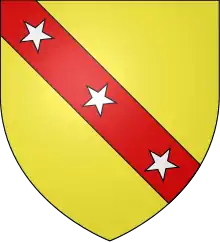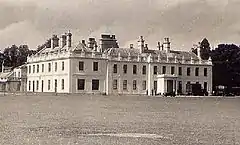Charles Bampfylde
Sir Charles Warwick Bampfylde, 5th Baronet (23 January 1753 – 19 April 1823)[1] of Poltimore in Devon, was a British politician who served twice as Member of Parliament for Exeter, in 1774–1790 and 1796–1812.[2]

Origins

He was the eldest surviving son of Sir Richard Bampfylde, 4th Baronet by his wife Jane Codrington (d. 1789), daughter and heiress of Colonel John Codrington of Charlton House,[3] Wraxall, Somerset, near Bristol.[4] He was baptised at St Augustine the Less Church, Bristol in Gloucestershire.[5]
Career
Bampfylde was educated at New College, Oxford and was awarded the degree of Doctor of Civil Law (DCL).[5] In 1776, he succeeded his father as baronet.[6] He was High Sheriff of Somerset for 1820–21 after the death in office of Gerard Berkeley Napier.
Between 1774 and 1790 Bampfylde sat as Member of Parliament for Exeter.[7] From 1796 he represented the constituency in the Parliament of Great Britain until the Act of Union in 1801, then in the Parliament of the United Kingdom until 1812.[7]
Marriage and progeny

On 9 February 1776, at St James's Church, Piccadilly, he married Catharine Moore, eldest daughter of Admiral Sir John Moore, 1st Baronet,[8] by whom he had two sons and a daughter:[8]
- George Bampfylde, 1st Baron Poltimore (1786–1858), eldest son and heir, in 1831 elevated to the peerage as Baron Poltimore.
- Rev. Charles Bampfylde, a priest.[9]
- Louisa Bampfylde, wife of Lieutenant Edward Wells, Royal Navy.[10]
Murder attempt and death
On 7 April 1823 a shot was fired at Bampfylde in front of his house at Montagu Square in London by a jealous ex-servant, whose wife was still working in Bampfylde's household.[11] After he had seen his shot hitting Bampfylde, the man killed himself with a second pistol.[11]
Bampfylde survived, but died two weeks later.[8] An autopsy showed that the shot itself had passed the lungs and had come to a stillstand between the ribs, however that with the bullet also a little piece of his braces had entered the body and had effected a deadly gangrene.[12] Bampfylde was buried at Hardington in Somerset.[12]
Succession
His elder son George Bampfylde, 1st Baron Poltimore succeeded to the baronetcy and was later elevated to the peerage as Baron Poltimore.[6]
References
- "Leigh Rayment – Baronetage". Retrieved 5 April 2009.
- History of Parliament biography of Bampfylde, Charles Warwick (1753–1823), of Poltimore, Devon
- History of Parliament biography
- Vivian, Lt.Col. J.L., (Ed.) The Visitations of the County of Devon: Comprising the Heralds' Visitations of 1531, 1564 & 1620, Exeter, 1895, p.40
- "ThePeerage – Sir Charles Warwick Bamfylde, 5th Bt". Retrieved 13 January 2009.
- Burke, John (1832). A Genealogical and Heraldic History of the Peerage and Baronetage of the British Empire. vol. II (fourth ed.). London: Henry Colburn and Richard Bentley. pp. 305–306.
- "Leigh Rayment – British House of Commons, Exeter". Archived from the original on 29 November 2017. Retrieved 5 April 2009.
- Debrett, John (1824). Debrett's Baronetage of England. vol. I (5th ed.). London: G. Woodfall. p. 140.
- Vivian, Lt.Col. J.L., (Ed.) The Visitations of the County of Devon: Comprising the Heralds' Visitations of 1531, 1564 & 1620, Exeter, 1895, p.41
- Vivian, p.41
- Smith, Thomas (1833). A Topographical and Historical Account of the Parish of St Mary-le-Bone. London: John Smith. p. 315.
- Sylvanus, Urban (1823). The Gentleman's Magazine. London: John Harris and Son. pp. 468–469.
External links
- Hansard 1803–2005: contributions in Parliament by Sir Charles Bampfylde, 5th Baronet
- Burial record on findagrave.org
| Parliament of Great Britain | ||
|---|---|---|
| Preceded by John Buller John Rolle Walter |
Member of Parliament for Exeter 1774–1790 With: John Rolle Walter 1774–1776 John Baring 1776–1790 |
Succeeded by James Buller John Baring |
| Preceded by James Buller John Baring |
Member of Parliament for Exeter 1796–1801 With: John Baring |
Succeeded by Parliament of the United Kingdom |
| Parliament of the United Kingdom | ||
| Preceded by Parliament of Great Britain |
Member of Parliament for Exeter 1801–1812 With: John Baring 1801–1802 James Buller 1802–1812 |
Succeeded by William Courtenay James Buller |
| Baronetage of England | ||
| Preceded by Richard Bampfylde |
Baronet (of Poltimore) 1776–1823 |
Succeeded by George Bampfylde |